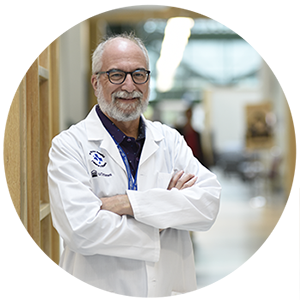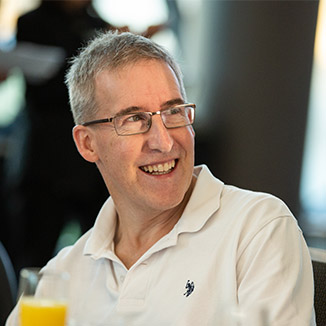
When Dr. Harry Atkins was young, he wanted to be an architect. Everything changed with one high school biology project, and now Dr. Atkins is pioneering the use of stem cells to reprogram people’s immune systems.
Along with Dr. Mark Freedman, he has developed a stem cell therapy for certain forms of multiple sclerosis. They have treated more than 70 patients so far, with very promising results. Thanks to this treatment, one patient who had previously needed a wheelchair was able to fulfil her dream of dancing at her own wedding!
Dr. Atkins took some time to tell us about his long and storied career here at The Ottawa Hospital — where he currently works as a Senior Clinician Investigator in the Cancer Therapeutics Program and Physician for the Transplant and Cell Therapy Program.
Q: What was it about that high school biology project that made you switch from wanting to be an architect to looking at a career in medicine?
A: I became fascinated with how the human body worked, each system interacting with the other in precise ways. I wanted to understand how the body worked in health and disease and harness the knowledge to help design new treatments.
Q: What is the most interesting thing you have learned during your time working in immune system repair and stem cell transplantation?
A: I find it a bit miraculous that the immune system regrows in a manner that allows it to re-establish self-tolerance and not develop autoimmunity again.
What are stem cells?
Every tissue and organ in the body is made up of billions of cells, each with a specialized function. Stem cells are the blank-slates from which all other types of cells originate. They have the ability to divide and make exact copies of themselves or produce specialized cells that can then become new heart muscle cells, brain cells, or other types of cells that can repair damaged organs and tissues.
Q: And how has the field of immune system repair and stem cell transplantation changed since you first started?
A: It’s used to treat a greater number of autoimmune diseases. Generally, patients are treated earlier in their disease course, so there are better outcomes, and the procedure is better tolerated.
Q: You treated John Chafe back in 2001; he was the second person in a world-first clinical trial of its kind that virtually eliminated any new multiple sclerosis (MS) activity. You described early patients like him as “brave,” can you tell us a bit about what made those early cases so special?
A: The first patients were especially courageous as they accepted the risks of undergoing a stem cell transplant without much knowledge about whether it would make their disease better. This is not to minimize the bravery of the others who have received the treatment along the way, because the risks of stem cell transplant are real and significant. But now we know more about the outcome of this treatment.

“I’m not a bank president, but my life is better than incredible. I ski, I dance with my wife, and have an nine-year-old daughter. Because Dr. Freedman and Dr. Atkins were persistent about finding the answers to stop a disease like MS, they saved my life.”
— John Chafe
Q: Later, you treated Heather Harris, another patient with MS, who now spends her time camping, skiing, running, and raising a young daughter. How does it feel seeing patients achieve dreams they had set aside after their diagnoses?
A: It is overwhelming to see the transplant recipients leave many of the issues caused by MS behind them and be able to achieve their dreams.

Q: If someone has just been diagnosed with multiple sclerosis, what advice would you give them?
A: Their MS neurologist is a very knowledgeable and dedicated professional who wants to see their MS controlled. Treatment decisions should be discussed with them. Be cautious about what appears on the internet.
Q: A large part of what you do at The Ottawa Hospital is stem cell research. Why are research and clinical trials so important?
A: Research and clinical trials help us understand MS better in order to design or refine treatments for this illness. It will certainly help improve the care that can be provided.
Q: The Ottawa Hospital’s Regenerative Medicine Program is unlike any other in Canada, and maybe the world. What sets our program apart?
A: Some of the strengths of this program are the multidisciplinary interactions and collaborations between scientists and healthcare providers as well as the value placed on these collaborations and working together.

